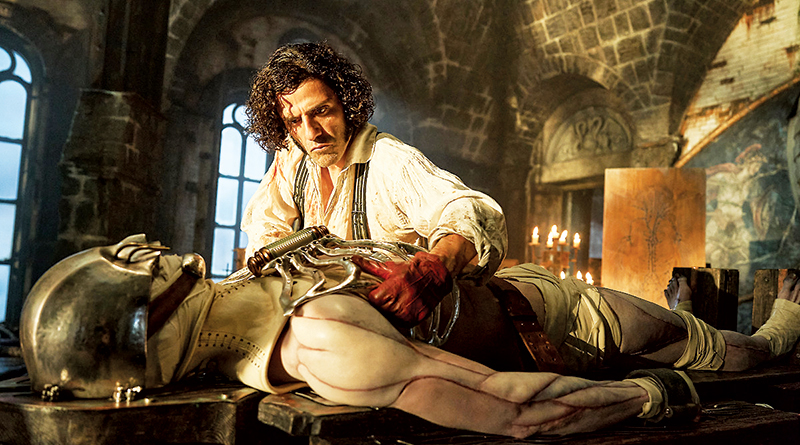‘Frankenstein’ Delivers Vivid Visuals & Plenty Of Drama: At The Movies With Kasey

Years ago, I taught Mary Shelley’s Frankenstein in a 100-level college course in which the students were supposed to learn to examine texts in their historical and cultural context. Frankenstein is not only one of the first works of science fiction, but it also features Romantic themes about the meaning of life, and a sad streak coming from Shelley’s grief over the deaths of her mother and two babies of her own. There is so much to work with in the book, so my hopes were high when Guillermo del Toro adapted the story.
As you likely know, Frankenstein focuses on a medical student, Victor Frankenstein (Oscar Isaac), who becomes obsessed with the idea of defeating death. He uses ill-gotten cadavers to stitch together a man, but when a surge of electricity animates The Creature (Jacob Elordi), Victor decides that he has made a monster and abandons it. The Creature sets out on his own journey, learning what it means to be human and seeking revenge against his creator. Christopher Waltz stars as Victor’s benefactor. And Mia Goth and Felix Kammerer appear as his sister-in-law and younger brother.
Del Toro’s Frankenstein features stunning visuals that highlight the themes around mortality and the sublime in Shelley’s novel. The beautifully dark settings are interjected with moments of shocking, stylized gore. The scenes in which Victor experiments with reanimating are showstoppers.
The dramatic visuals are worth watching the film on their own, but my favorite part of the film is Oscar Isaac’s absolutely unhinged portrayal of Victor. In the book, the character is quite dramatic, and he has fevers and is going mad, but Isaac takes it to an almost comical level of mania. As the kids say, he left no crumbs. In contrast, the quiet despair and then seething rage of The Creature come through in Jacob Elordi’s performance. Both actors give their characters humanity through vivid emotions. The problem, however, is that these interpretations, influenced by del Toro’s screenplay, remove much of the ambiguity from the story. Instead of wrestling with questions about playing God and scientific ethics, Victor seems to be plainly in the wrong.
Although this adaptation of Frankenstein is one of the most faithful I can remember, it still makes changes that I am not convinced worked for the story. Del Toro strips out much of the Frankenstein family drama and, therefore, the angst that gives the story nuance. Instead, he places the events during the Crimean War and invents the war-profiteering character played boringly by Christopher Waltz. We lose two of Victor’s friends from the story and the most emotional moments. I think this was a bad trade.
Frankenstein was written and directed by Guillermo del Toro, based on the novel by Mary Shelley. It runs 149 minutes and is rated R. It is streaming on Netflix.
Guillermo del Toro wrote Frankenstein’s friends out of the story, but if you want a film about friendship and overcoming trauma (something Victor probably needed), check out Sorry, Baby on HBO.
In Sorry, Baby, Agnes (Eva Victor) and Lydie (Naomie Ackie) are graduate students living in a small college town. Agnes shows promise as a rising scholar, but an assault by her advisor, Preston Decker (Louis Cancelmi), threatens to derail her whole life. In the aftermath, Lydie helps her find her feet again. Agnes also deals with the misplaced jealousy of her frenemy Natasha (Kelly McCormack) and finds something approximating a relationship with her neighbor, Gavin (Lucas Hedges).
Sorry, Baby is an odd, tender film. Writer/director/star Eva Victor perfectly captures the grad school experience when she jumps from an almost silent scene to Lydie screaming in frustration over her thesis. The insecurity and cut-throat competition conveyed by the quirky characters reminded me of my own time in an English department, and Victor uses stillness and changing light to capture the loneliness that Agnes feels.
As Agnes, Victor also draws on subtle, dry humor and an openness to affection to give the character a surprisingly sweet nature. In less skilled hands, the character could have been a flat caricature of a dorky professor, and the emotional stakes of the story would have fallen apart. What makes the movie so beautiful is how Agnes’s awkwardness plays off of other characters as they care for each other. As outgoing and vibrant Lydie, Naomie Ackie provides outbursts and humor within an otherwise toned-down film, and her chemistry with Victor feels like real friendship. In the one scene they share, John Carroll Lynch’s Pete gruffly helps Agnes through a panic attack, and the contrast between her vulnerability and his toughness sparkles. As Gavin, Lucas Hedges is even more awkward than Agnes, making their scenes cute and uncomfortable.
Ultimately, Sorry, Baby uses these quiet moments to develop a message that when life is hard, sometimes all we can do is be there for each other, but doing that matters immensely. It’s a little weird, but also an emotionally resonant film.
Sorry, Baby was written and directed by Eva Victor. It runs 103 minutes and is rated R.
- Documentaries & Biopics To Stream In The New Year: At The Movies With Kasey - January 16, 2026
- Reviewing Holiday Features: At The Movies With Kasey - December 19, 2025
- ‘Pluribus’ Weighs Individuality Vs Harmony: At The Movies With Kasey - December 5, 2025


